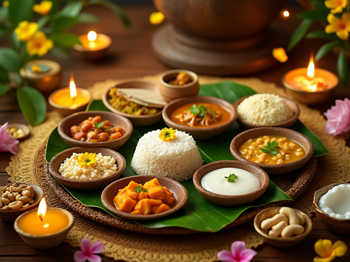The Vishu Puja holds profound significance as it symbolizes the transition of time and the cyclical nature of life. It is a moment to offer prayers for prosperity, health, and happiness in the new year. The puja involves the ritualistic arrangement known as the "Vishukkani," which is the first thing people see on the morning of Vishu. The Vishukkani is meticulously arranged with items that symbolize prosperity and abundance, such as grains, fruits, vegetables, flowers, gold, and a sacred text. This sight is believed to set a positive tone for the rest of the year, ensuring a path filled with good fortune.
- Prosperity and Abundance: Performing Vishu Puja is believed to bring wealth, success, and abundance into the household for the coming year.
- Spiritual Renewal: The puja offers a chance for spiritual reflection and renewal, helping individuals align with the positive energies of the universe.
- Family Bonding: The rituals of Vishu bring family members together, strengthening bonds and fostering a sense of unity and love within the family.
- Cultural Continuity: Observing Vishu and its rituals helps in preserving cultural heritage and passing on traditions to younger generations.
- Mental Peace: Participating in the puja and associated rituals can bring mental peace and clarity, as it involves meditation, chanting, and focusing on positive intentions.
- Health and Well-being: Offering prayers for health during Vishu Puja is believed to invoke divine blessings for physical and mental well-being throughout the year.
- New Beginnings: The festival encourages letting go of past grievances and mistakes, promoting forgiveness, and making a fresh start with optimism and hope.
Vishu is not just a festival; it is a celebration of life, prosperity, and the enduring spirit of hope that each new year brings.
Vishu is a significant festival celebrated primarily in Kerala and some parts of Tamil Nadu, marking the beginning of the Malayalam New Year. It's known for its unique customs and rituals, which are meant to bring prosperity and good fortune for the coming year. Here's a step-by-step guide on how to perform the Vishu celebrations:
1. Preparation for Vishu Kani
- Vishu Kani is the most important ritual of Vishu. It involves arranging a set of auspicious items in front of an image or idol of Lord Krishna or Lord Vishnu.
- The items traditionally included in the Vishu Kani are:
- Rice (symbol of abundance)
- Golden cucumber
- Jackfruit
- Coconut
- Betel leaves and arecanut
- Mirror (usually a metal mirror called "Vaalkannadi")
- Konna flowers (Cassia fistula, known as the golden shower tree)
- Coins or currency (symbolizing wealth)
- Holy text (usually the Bhagavad Gita or Ramayana)
- Oil lamp (Nilavilakku or Kuthuvilakku)
- Arrange these items the night before Vishu, in front of the deity, ensuring they are placed in an aesthetically pleasing manner.
2. Vishu Kani Darshanam (Seeing the Vishu Kani)
- Early in the morning, preferably around 4-5 AM, wake up without opening your eyes and proceed to see the Vishu Kani. This is believed to bring good fortune.
- The eldest member of the family usually guides the younger ones to the Kani.
- After seeing the Kani, the family members seek blessings from the elders.
3. Lighting the Lamp
- After seeing the Vishu Kani, light the lamp (Nilavilakku) in front of the deity. Offer prayers to Lord Krishna or Lord Vishnu.
- Recite the Vishu slokas and seek blessings for prosperity, health, and happiness in the coming year.
4. Vishu Kaineettam
- After the prayers, the elder members of the family distribute Vishu Kaineettam, which is a gift of money, to the younger ones. This is considered a blessing for prosperity.
5. Vishu Sadya (Feast) Preparation
- Prepare the Vishu Sadya, a grand feast, which is an integral part of the celebration. The Sadya typically includes dishes like:
- Rice
- Sambar
- Aviyal
- Thoran
- Olan
- Pachadi
- Payasam (a sweet dish)
- The food is served on banana leaves and is eaten with the family.
6. Visit the Temple
- If possible, visit a nearby temple to offer prayers. Special Vishu prayers are often held in temples, with the deity adorned beautifully.
7. Enjoying Vishu Celebrations
- After the rituals and the feast, families often engage in social visits, meeting friends and relatives to exchange Vishu greetings.
- Children and adults may also engage in traditional games and activities.
8. Cultural Activities
- Participate in or enjoy traditional cultural activities like Vishu Padakkam (firecrackers) and folk dances if organized within the community.
9. Offering Charity
- Some families also believe in offering charity on Vishu, sharing their abundance with those in need.
10. Conclusion of the Day
- The day concludes with light prayers and reflections on the year ahead, fostering a sense of optimism and togetherness.
By following these steps, Vishu is celebrated with great devotion, joy, and a sense of community, ensuring a prosperous and harmonious start to the new year.




